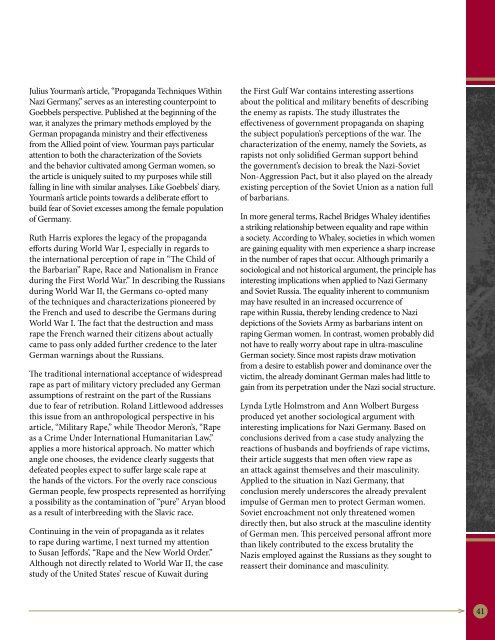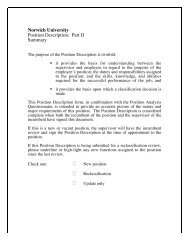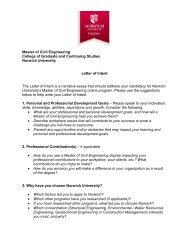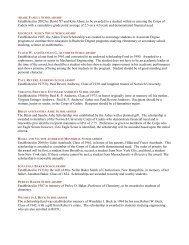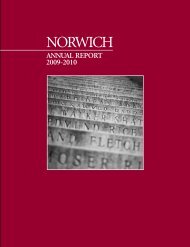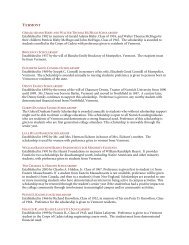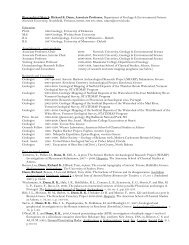Surviving Master's-Level History Programs at Norwich University: A ...
Surviving Master's-Level History Programs at Norwich University: A ...
Surviving Master's-Level History Programs at Norwich University: A ...
- No tags were found...
You also want an ePaper? Increase the reach of your titles
YUMPU automatically turns print PDFs into web optimized ePapers that Google loves.
Julius Yourman’s article, “Propaganda Techniques WithinNazi Germany,” serves as an interesting counterpoint toGoebbels perspective. Published <strong>at</strong> the beginning of thewar, it analyzes the primary methods employed by theGerman propaganda ministry and their effectivenessfrom the Allied point of view. Yourman pays particular<strong>at</strong>tention to both the characteriz<strong>at</strong>ion of the Sovietsand the behavior cultiv<strong>at</strong>ed among German women, sothe article is uniquely suited to my purposes while stillfalling in line with similar analyses. Like Goebbels’ diary,Yourman’s article points towards a deliber<strong>at</strong>e effort tobuild fear of Soviet excesses among the female popul<strong>at</strong>ionof Germany.Ruth Harris explores the legacy of the propagandaefforts during World War I, especially in regards tothe intern<strong>at</strong>ional perception of rape in “The Child ofthe Barbarian” Rape, Race and N<strong>at</strong>ionalism in Franceduring the First World War.” In describing the Russiansduring World War II, the Germans co-opted manyof the techniques and characteriz<strong>at</strong>ions pioneered bythe French and used to describe the Germans duringWorld War I. The fact th<strong>at</strong> the destruction and massrape the French warned their citizens about actuallycame to pass only added further credence to the l<strong>at</strong>erGerman warnings about the Russians.The traditional intern<strong>at</strong>ional acceptance of widespreadrape as part of military victory precluded any Germanassumptions of restraint on the part of the Russiansdue to fear of retribution. Roland Littlewood addressesthis issue from an anthropological perspective in hisarticle, “Military Rape,” while Theodor Meron’s, “Rapeas a Crime Under Intern<strong>at</strong>ional Humanitarian Law,”applies a more historical approach. No m<strong>at</strong>ter whichangle one chooses, the evidence clearly suggests th<strong>at</strong>defe<strong>at</strong>ed peoples expect to suffer large scale rape <strong>at</strong>the hands of the victors. For the overly race consciousGerman people, few prospects represented as horrifyinga possibility as the contamin<strong>at</strong>ion of “pure” Aryan bloodas a result of interbreeding with the Slavic race.Continuing in the vein of propaganda as it rel<strong>at</strong>esto rape during wartime, I next turned my <strong>at</strong>tentionto Susan Jeffords’, “Rape and the New World Order.”Although not directly rel<strong>at</strong>ed to World War II, the casestudy of the United St<strong>at</strong>es’ rescue of Kuwait duringthe First Gulf War contains interesting assertionsabout the political and military benefits of describingthe enemy as rapists. The study illustr<strong>at</strong>es theeffectiveness of government propaganda on shapingthe subject popul<strong>at</strong>ion’s perceptions of the war. Thecharacteriz<strong>at</strong>ion of the enemy, namely the Soviets, asrapists not only solidified German support behindthe government’s decision to break the Nazi-SovietNon-Aggression Pact, but it also played on the alreadyexisting perception of the Soviet Union as a n<strong>at</strong>ion fullof barbarians.In more general terms, Rachel Bridges Whaley identifiesa striking rel<strong>at</strong>ionship between equality and rape withina society. According to Whaley, societies in which womenare gaining equality with men experience a sharp increasein the number of rapes th<strong>at</strong> occur. Although primarily asociological and not historical argument, the principle hasinteresting implic<strong>at</strong>ions when applied to Nazi Germanyand Soviet Russia. The equality inherent to communismmay have resulted in an increased occurrence ofrape within Russia, thereby lending credence to Nazidepictions of the Soviets Army as barbarians intent onraping German women. In contrast, women probably didnot have to really worry about rape in ultra-masculineGerman society. Since most rapists draw motiv<strong>at</strong>ionfrom a desire to establish power and dominance over thevictim, the already dominant German males had little togain from its perpetr<strong>at</strong>ion under the Nazi social structure.Lynda Lytle Holmstrom and Ann Wolbert Burgessproduced yet another sociological argument withinteresting implic<strong>at</strong>ions for Nazi Germany. Based onconclusions derived from a case study analyzing thereactions of husbands and boyfriends of rape victims,their article suggests th<strong>at</strong> men often view rape asan <strong>at</strong>tack against themselves and their masculinity.Applied to the situ<strong>at</strong>ion in Nazi Germany, th<strong>at</strong>conclusion merely underscores the already prevalentimpulse of German men to protect German women.Soviet encroachment not only thre<strong>at</strong>ened womendirectly then, but also struck <strong>at</strong> the masculine identityof German men. This perceived personal affront morethan likely contributed to the excess brutality theNazis employed against the Russians as they sought toreassert their dominance and masculinity.41


